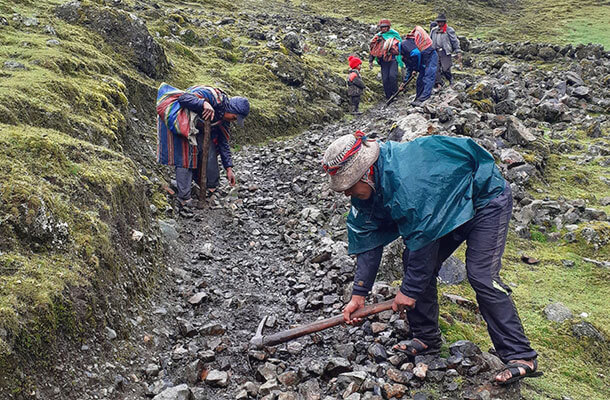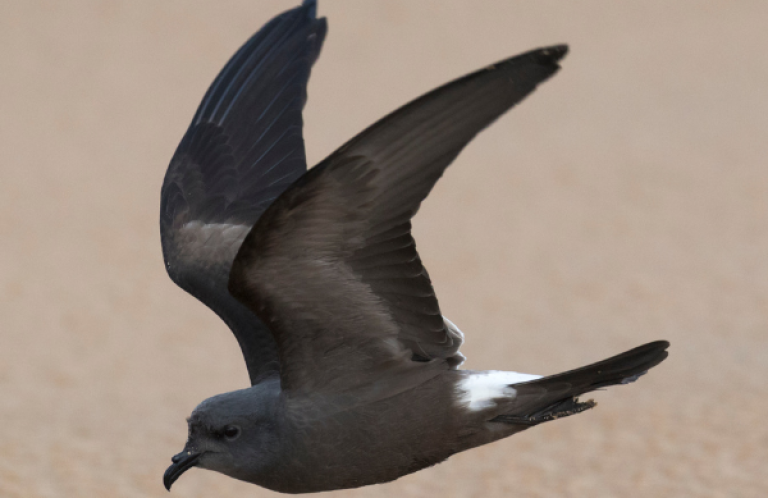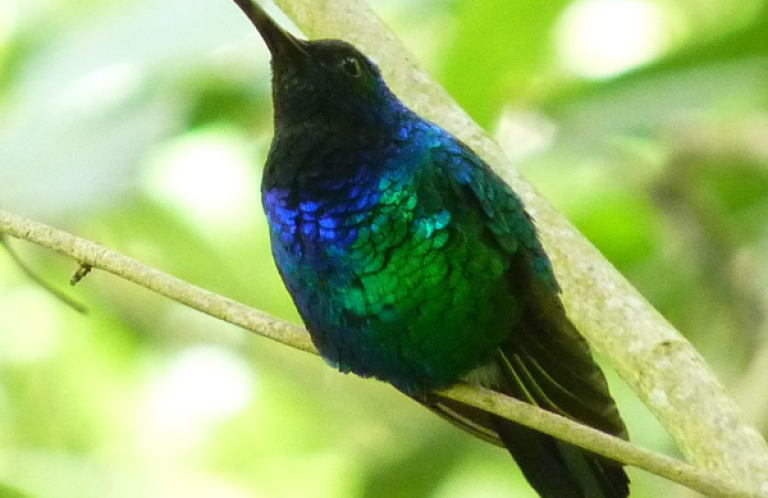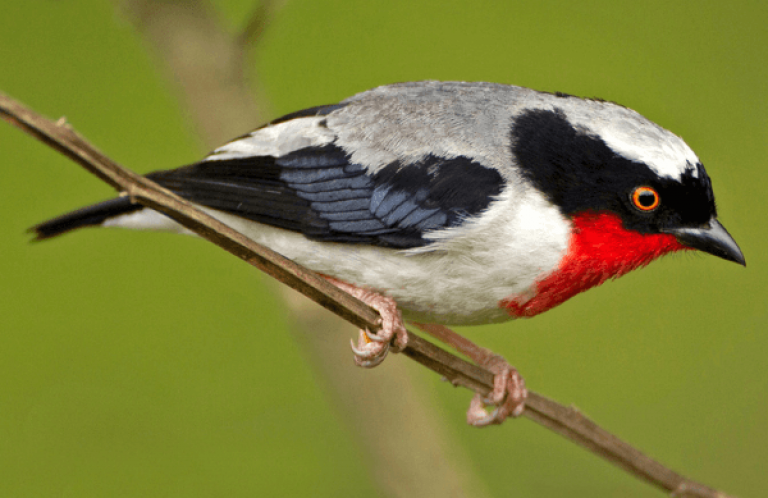Trail Network and Tree Nurseries Improving Lives in the High Andes

Community members maintain trails on the Vilcanota Trek. Photo by Gregorio Ferro M., ECOAN
In the latest chapter in a decades-long partnership, Asociación Ecosistemas Andinos (ECOAN), with support from partner American Bird Conservancy (ABC), has worked with communities in the Cordillera Vilcanota of southern Peru since August 2019 to make new infrastructure improvements that benefit local livelihoods and increase forest cover protecting watersheds and rare birds.
The Cordillera Vilcanota, a range of the Andes Mountains near Cusco, Peru, is rich in history and biodiversity. Glaciated peaks soar to over 20,000 feet amid vast expanses of high-elevation open páramo, dotted with lakes and villages inhabited by descendants of the Inca. Vilcanota is also home to some of the world's highest-elevation forests, comprised of Polylepis trees, members of the rose family that create dense, mossy forests at elevations between 12,000 and 16,000 feet. This habitat is critically important to conserve water supplies used both by high Andean communities and populous towns downslope, and supports highly specialized, threatened birds, including the Critically Endangered Royal Cinclodes and Endangered White-browed Tit-Spinetail.
Regrettably, only 3 percent of these forests remain after generations of cutting for firewood, building materials, and agricultural expansion, and uncontrolled burning aimed at improving pastures. ECOAN was founded in 2000, stimulated by a desire to protect these dwindling forests, their birdlife, and the communities that depend on them. The next year, ECOAN and ABC began partnering on the protection and restoration of Vilcanota's forests. After nearly two decades as partners, accomplishments include the creation of nine private, community-managed conservation areas spanning 21,285 acres (see also https://abcbirds.org/article/milestone/kuntur-wachana-pca) and the planting of over 1.5 million Polylepis trees.
Many of these trees were planted over the last six years, after ECOAN and the communities developed an annual reforestation event called Queuña Raymi, or “Polylepis Festival” in the native Quechua language. Each year, hundreds of thousands of Polylepis trees are now planted at huge celebrations in multiple communities over a period of two to three months.
The annual Queuña Raymi requires a network of high-production tree nurseries distributed among the communities. Over the last few months, ECOAN and community members constructed a new nursery with a capacity of 25,000 plants at Abra Málaga Thastayoc, one of the first communities to become involved in the restoration work. In addition, an existing nursery in the village of Pampacorral was upgraded to a capacity of 30,000 plants.
For years, ECOAN, with ABC support, has worked to help these communities diversify their incomes. Over the last six months, the organization provided guidance to local communities on one such ongoing initiative — a trail maintenance project on the Vilcanota Trek, a 56-mile-long trail network linking 16 campesino communities. Hundreds of community members banded together, working on nearly 19 miles of trail, improving footpaths and signage. While some are relatively new trails, others have been used for hundreds, if not thousands, of years.
These trail improvements and forest enhancements help drive ecotourism to the area, both generating income for communities and benefiting the environment. The trail network is attracting international attention as an alternative to the often-crowded Inca Trail. It offers stunning scenery viewed from trails that wind through valleys lined with Polylepis forests, past alpine tarns, and over passes with vistas of dramatic peaks such as the nearly 19,000-foot-tall Huacaywillki. The communities there offer camping, guest houses, guides and mule drivers, and the ability to purchase handmade textiles directly from the weavers themselves. See http://www.vilcanotatrek.com/vteng.html for more details on access, routes, and services.
Early on, ECOAN recognized that these communities would become true partners in conservation if they derived benefits from conserving and growing their forests. Other incentives provided include: medical and dental visits to remote communities, deliveries of firewood from eucalyptus forests at lower elevation, installation of solar panels for electricity, provision of efficient clay stoves that reduce fuelwood use and exposure to damaging cooking smoke, and payments for participation in reforestation.
ABC gratefully acknowledges the Jeniam Foundation for their support of this ongoing project.
###
Media Contact: Jordan Rutter, Director of Public Relations, 202-888-7472 | jerutter@abcbirds.org | @JERutter
Expert Contact: George Wallace, Threatened Species Conservation Officer | gwallace@abcbirds.org
American Bird Conservancy is a nonprofit organization dedicated to conserving wild birds and their habitats throughout the Americas. With an emphasis on achieving results and working in partnership, we take on the greatest problems facing birds today, innovating and building on rapid advancements in science to halt extinctions, protect habitats, eliminate threats, and build capacity for bird conservation. Find us on abcbirds.org, Facebook, Instagram, and Twitter (@ABCbirds).


















































